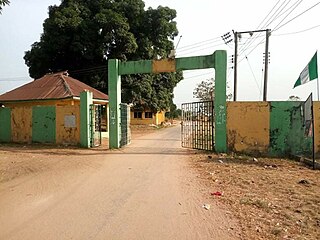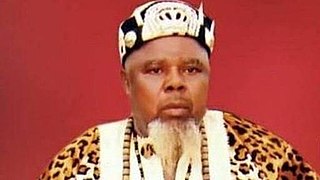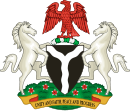
Owerri is the capital city of Imo State in Nigeria, set in the heart of Igboland. It is also the state's largest city, followed by Orlu, Okigwe and Ohaji/Egbema. Owerri consists of three Local Government Areas including Owerri Municipal, Owerri North and Owerri West, it has an estimated population of about 1,401,873 as of 2016 and is approximately 100 square kilometres (40 sq mi) in area. Owerri is bordered by the Otamiri River to the east and the Nworie River to the south. The Owerri Slogan is Heartland. It's also called the las Vegas of Africa, due to the night life of the city and the numerous number of hotels, casino and leisure parks all over of the city

Awka is the capital city of Anambra State, Nigeria. The city was declared capital on 21 August 1991, after the creation of Anambra and Enugu state, which moved the capital from Enugu to Awka. The city has an estimated population of 301,657 as of the 2006 Nigerian census. The both LGAs of Awka South and North had a estimated population of 430,200 in 2022. The city is located at 199.1 kilometres (123.7 mi), by road, directly north of Port Harcourt in the centre of the densely-populated Igbo heartland in South-East Nigeria.
Arondizuogu (Aro-ndizuogu) is a town inhabited by the Igbo subgroup of the Aro people in Imo State of Nigeria. The Arondizuogu community is believed to have migrated from Arochukwu in the present Abia State to their current settlements in Imo state, which include the Okigwe, Ideato North and Onuimo local governments. However, others of Aro descent are in other local governments in Imo State.

Orlu is the second-largest city in South East, Imo State, Nigeria, with a population of 420,600. It has a long history as the headquarters for the Organisation of African Unity (OAU) and humanitarian relief agencies during the Nigeria-Biafra Civil War. The city houses the Nigerian headquarters of the British Cheshire Home. It is the second most developed city after Owerri in Imo state.

Oguta is a town on the east bank of Oguta Lake in Imo State of southeastern Nigeria.
Anara is a town located in Isiala Mbano, Imo State, Nigeria. It is located about 30 km (20 mi) northeast of Owerri, and connected by a historic road. The town is bordered by Amaraku, Eziama, Abba, amongst other communities. It originated as a settlement made up of eight villages, with Aguna being the oldest of them. Anara's population stands at around 70,000; nevertheless, it is experiencing growth owing to a recent surge in immigration. The town celebrates many festivities, including Anara Day, the Awa festival, and the New Yam festival. great
Ejemekwuru is an Igbo-speaking community that sits in the North-Western part of Imo State in the southeastern region of Nigeria.
Igbo culture are the customs, practices and traditions of the Igbo people of southeastern Nigeria. It consists of ancient practices as well as new concepts added into the Igbo culture either by cultural evolution or by outside influence. These customs and traditions include the Igbo people's visual art, music and dance forms, as well as their attire, cuisine and language dialects. Because of their various subgroups, the variety of their culture is heightened further.
The Igbo calendar is the traditional calendar system of the Igbo people from present-day Nigeria. The calendar has 13 months in a year (afo), 7 weeks in a month (onwa), and 4 days of Igbo market days in a week (izu) plus an extra day at the end of the year, in the last month. The name of these months was reported by Onwuejeogwu (1981).

The New Yam Festival of the Igbo people is an annual cultural festival by the Igbo people that is held at the end of the rainy season in early August.
The Ogba people are tribe of the Benin people in Rivers state. The Ogba people speak Ogba, a language That has a mix of the Igboid family. The Ogbas reside in a local government called Ogba-Egbema-Ndoni in Rivers state Nigeria. The Ogba language has three dialects namely; Usomini, Igburu, Egi dialect. The Ogba kingdom is made up of three clans which includes; Egi, Igburu, Usomini clans, and its largest urban town is Omoku. Ogba people speak two dialects of the Ogba languages, the Egi and Igburu. Eligbo and Ukporomini are two Ogba communities in Ahaoda East Local Government Area, while Itu II in Emohua LGA also speaks Ogba language.

Orsu is a local government area (LGA) and tribe in the Imo State of Nigeria. Orsu is also the name of the dialect of this people. They are an Igbo sub-group located west of Orlu, north of Oguta and in the general areas around Oru East, Oru West, Ihiala, Nnewi south and Oguta LGAs. Orsu LGA is made up of several autonomous communities including Ihitenansa, Amaruru, Amazu, Amaebu, Amannachi, Awo-Idemili, Asaa Ubirielem, Eziawa, Umuhu Okabia, Orsu Ihiteukwa, Okwu Ufuruaku, Okwu Amaraihe, and Okwu Etiti.
Odumodu is a folk style of music that is predominantly sung among the Arochukwu, Bende, Ohafia, Abiriba, Umuahia, Ikwuano, and Ngwa people of the Igbo ethnic group, of Abia State, located in southeastern Nigeria. It is mainly used to uplift spirits and entertain guests at events, while extolling the virtues of illustrious men and women, and telling stories that edify.
Omuma town is the headquarters of Oru East Local Government Area of Imo State in the Southeastern part of Nigeria. It is one of the oldest towns in Imo State. Omuma is located at latitude 5.560° N and longitude 6.972° E. Its boundary to the west is Mgbidi, to the east by Akatta and Attah, to the north by Eleh and Nempi and to the south by Amiri and Otulu. Omuma has four communities: Abia-Omuma, Ozuh-Omuma, Umuhu-Omuma, and Etiti-Omuma. The current Imo state governor, Hope Uzodinma, is from Omuma.
Afiaolu is a traditional festival held annually in Nnewi, Anambra State, Nigeria around August. The Afiaolu festival commences on “Eke” day with what is traditionally described as “Iwaji” and Ikpa Nku, this heralds the availability of new yam as well as thanksgiving to God. The festival includes a variety of entertainments including performance of ceremonial rites by the Igwe (king), cultural dance by girls and masquerade dance.

Pericomo Damian Azubike Nwankwo Okoye, known as Pericoma, was a Nigerian singer, songwriter and traditionist. In addition to his music, he was known as a practitioner of Odinala, the traditional religion of the Igbo people.
For other places see Owo, a LGA in Ondo State

Yam is a staple food in West Africa and other regions classified as a tuber crop and it is an annual or perennial crop. The New Yam festival is celebrated by almost every ethnic group in Nigeria and is observed annually at the end of June.

In Igboland, there are different festivities that are celebrated, but the most influential of all include the masquerade festival and the New Yam Festival.









